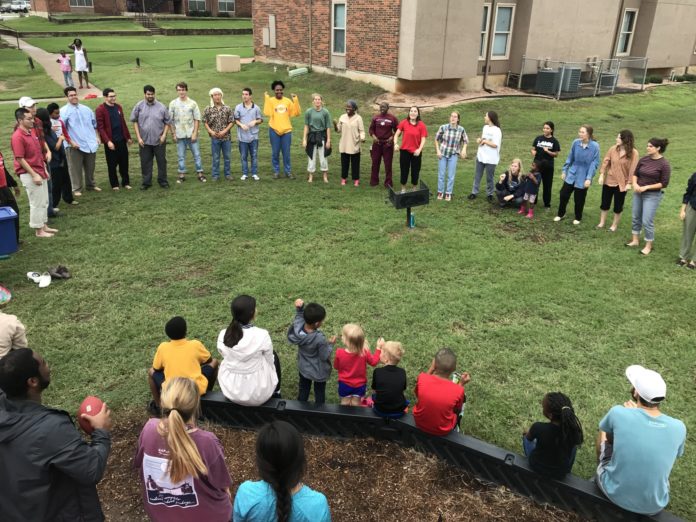
Maddie Gee | Reporter
In Waco, the poverty rate is more than one-fourth of the population, at 27.5 percent. This weekend, Mission Waco conducted its annual “Poverty Simulation,” which exemplifies the life of Waco’s homeless community to students.
Tyler senior Mary Kathryn Bauman has been familiar with the Poverty Simulation and Mission Waco since last semester.
“I worked with Mission Waco last semester as an intern with a class at Baylor. I really wanted to do the poverty simulation, but I did not have a group of people to do it with — and it is a daunting thing to go and do alone,” Bauman said. “I was excited when BSM (Baptist Student Ministries) said they were going to do it.”
Aledo senior and Baptist Student Ministries member Brett Peterson sees the power behind Baylor students engaging in this once-in-a-lifetime experience.
“I think the Poverty Simulation is super powerful for Baylor students because it helps us to physically connect with — even if it is just for a couple days — the experiences and hardships of the many people around us and around the world who are daily dealing with poverty. The Baylor economic bubble is a very real thing, and it is often hard for us to relate to the hardships of those below the poverty line because we have never personally experienced such issues. The Poverty Simulation, however, can be a great way to begin bridging this gap because sharing in the experience of those who are different than you can can help you to begin to love and understand them in new ways” Peterson said.
For Bauman, this was an opportunity to branch out of her comfort zone and attempt to empathize and relate more to those without a roof over their head.
“My guide for my internship last semester was John Calaway, who is the executive director of Mission Waco,” Bauman said. “I got to hear a lot of their ideology, and it really made an impression on me. How I see the poverty in Waco is that their way of approaching it is to empower the poor and those in poverty.”
This approach to the homeless population was different from what Bauman grew up seeing.
“It really challenged my whole view on it because I grew up in church, and you usually hear ‘give money’ or ‘do this project,’ and their way of doing it is ‘we are going to work with these people,’ Bauman said. “They are not less than us, they are just in a different situation than us. We are going to try to create opportunities for them that for some reason or another the world is not offering them.”
After attending the Poverty Simulation, Bauman experienced a life that she was not used to.
“There is a lot of walking involved and we were out and about in the community which was cool because you got to interact with people,” Bauman said. “There was definitely a difference in the way people interacted with us, but I wouldn’t go as far to say that people treated us as if we were definitely homeless, because people probably know about the simulation, and from one day our privilege is not completely washed off.”
The torrential weather from last weekend definitely played a factor.
“I was not expecting to get as wet as we did. That was not really one of the things that I expected to be presented with,” Bauman said. “The helplessness that comes with not having all of the resources that I personally have, the inability to escape from such circumstances that some people do have to live, like a storm or something of that nature,” Bauman said.
Despite the terrible weather, Bauman still took lessons away from the experience.
“I think my biggest takeaway is two-sided. My assigned shoes for the weekend, they just completely gave out and fell apart in the rain — I was in socks for the rest of the weekend. The reality is that most of the time, for a lot of people, the only tangible items that we give to the poor are items that we have used to the point that we no longer want to use them, myself included. Just thinking about giving them things that are new from time to time, and when we do give them those things they might not be helping as much as we think they do. We have to work with the poor and not just for them. We have to empower them.”





